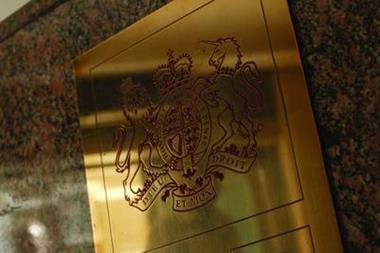The failure of foreign regulators to prosecute firms for carrying out corrupt business practices abroad to win new business, has led the US to step into the breach waving a big stick with which to punish firms and individuals, with the threat of massive fines and jail sentences. Neil Hodge explains
Over the past few years US regulators such as the Department of Justice (DOJ) and the Securities and Exchange Commission (SEC) have increasingly turned their attention towards the ‘questionable’ activities of foreign companies. They have been spurred on by complaints by US corporations that foreign firms are at a competitive advantage because they are rarely prosecuted by their own domestic regulators for corrupt practices overseas .
US legislation – the Foreign and Corrupt Practices Act (FCPA) – allows prosecutors to take action against such companies, even though the corruption may be taking place in another country. Those firms that conduct business in the US are subject to scrutiny, as are those that use the services of firms and individuals based there.
The Act was created in 1977 after a 1970s investigation by the Securities and Exchange Commission (SEC) found that over 400 US companies had made questionable or illegal payments in excess of $300m to foreign government officials, politicians, and political parties. During the 30 years since the Act was enacted, its scope has been extended, with US prosecutors using it in a tenacious pursuit of corporate wrongdoing in the US and abroad. US lawyers say that 1995 proved a milestone in terms of prosecutions when Lockheed paid a $25m fine for improper payments relating to contracts in Egypt and, for the first time, a businessman was sentenced to jail for violating the Act.
Action against foreign companies
Zach Harmon, a partner in US law firm King & Spalding’s Washington, DC office and a member of the firm’s special matters and government investigations practice group, says that ‘the extra territorial scope of the Act does seem to be expanding’. This, he says, is in part ‘due to a feeling that if the US does not move to change poor business practice, then no one else will.’
Harmon says that, ‘US companies have complained that foreign companies are at an advantage in terms of taking part in corrupt business practices. Not only do these practices win them contracts, but they are also unlikely to face any kind of serious penalty for carrying them out. The threat of action under the FCPA will help reduce that, and this is partly the reason why the FCPA has become more extra-territorial over the past decade.’
Jim Hough, head of the litigation group in the New York office of law firm Morrison & Foerster, says that ‘enforcement priorities are not really aligned between the US and Europe. As a result, the US is now much more prepared to push both foreign companies and individuals to follow its set of governance standards and regulations rather than rely on European regulators to clamp down on corrupt business practices.’
Due to the extra-territorial nature of the legislation – as well as its highly punitive measures – business advisers are now warning that many European companies and individuals could be in the firing line, and that many of them fail to appreciate the risk.
According to a recent report from KPMG Forensic, the fraud investigations arm of KPMG, almost half (46%) of respondents that conducted business in the US either wrongly believed they were not subject to the FCPA or did not know whether they were subject to it. In addition, 56% of respondents who said they were subject to the FCPA did not have, or did not know whether they had, an FCPA compliance programme.
These findings are hardly surprising, says Simon Bevan, head of the fraud services unit at BDO Stoy Hayward. He points out that in the UK, for example, there has not been a single prosecution for corrupt corporate practices abroad in the ten years since the Organisation for Economic Co-operation and Development (OECD) Convention on Combating Bribery of Foreign Public Officials in International Business Transactions came into force, a voluntary code which the US championed to ensure that its trading partners clamped down as harshly on foreign corrupt practices as it did.
‘It is little wonder, therefore, that US firms are becoming increasingly willing to point the finger at non-US firms and prompt regulators to investigate the business practices of rivals working in the same sector,’ he comments.
Bribery becoming rife?
Since companies based in the world’s leading economies have indicated that they are willing to pay bribes in exchange for a lucrative contract, it looks as if US regulators will be able to declare open season on foreign companies. It also gives a clear indication of how poorly enforcement actions are seen as a deterrent, says anti-corruption campaign group Transparency International, which monitors bribery in global business.
The group’s most recent Bribe Payers Index (BPI) – a measure of how willing a nation appears to comply with demands for corrupt business practices – found that several African countries, for example, identified French and Italian companies as among the worst perpetrators for offering bribes to secure contracts. A spokesperson for Transparency International says that ‘it is hypocritical that OECD-based companies continue to bribe across the globe while their governments pay lip-service to enforcing the law,’ adding that ‘the enforcement record on international anti-bribery laws makes for short and disheartening reading.’
High profile prosecutions
There have been some very high profile foreign prosecutions under the FCPA in recent months. In June 2007 the US Department of Justice (DOJ) announced that it was investigating defence contractor BAE Systems for its possible non-compliance with anti-corruption laws over securing contracts with the government of Saudi Arabia – an investigation that the UK Serious Fraud Office decided not to continue.
In November 2006 the DOJ announced that it was investigating German electronics and engineering giant Siemens over suspicious payments to win business contracts in Saudi Arabia and Nigeria worth up to €420m. It was also looking into possible violations concerning the United Nations Oil-For-Food humanitarian assistance programme in Iraq. Lawyers say that there is a real possibility that more German firms could be targeted under the FCPA, given the spate of corporate governance scandals that have recently been unearthed.
Tough penalties
As the international scope of prosecution has been increasing, so too have the financial penalties. Last May, Baker Hughes, a Houston-based oil services contractor, agreed to pay a $44.1m fine to settle a probe into alleged bribery in connection with its operations in Kazakhstan, Nigeria, Indonesia, Angola, Russia, and Uzbekistan. The settlement is the largest total penalty ever paid in a bribery case under the FCPA.
Experts agree that sanctions under the FCPA are possibly the toughest in the world. Under criminal prosecution, corporations and other business entities are subject to a fine of up to $2m while officers, directors, stockholders, employees, and agents are subject to a fine of up to $100,000 and imprisonment for up to five years.
Moreover, under the Alternative Fines Act, these fines may be up to twice the benefit that the defendant sought to obtain by making the corrupt payment. So, for example, if a company paid an official $10,000 to secure a $30m contract, then the SEC and DOJ can attempt to fine the company $60m. Furthermore, fines imposed on individuals may not be paid by their employer or principal.
The Act also affords a threat of civil action. The Attorney General or the SEC may bring a civil action for a fine of up to $10,000 against any firm, as well as any officer, director, employee, agent of a firm, or stockholder acting on behalf of the firm who violates the anti-bribery provisions.
Compare that level of enforcement to the UK. According to the OECD, 108 allegations of corruption have been made against UK citizens or companies since 2002. Yet of these, 24 were closed due to insufficient evidence, one was discontinued, and in 32 cases no action was taken.
However, the FCPA is not as wide-reaching as anti-bribery legislation in the UK, where bribery of public officials has been an offence since 1889. This was extended in 1906 when a new Act was introduced which makes it a crime to bribe any ‘agent’ – defined as anyone employed by, or acting for, another, whether in the public or private sector.
In the past ten years the UK government has ratified the OECD’s convention on combating bribery, the voluntary framework aimed at reducing corruption in developing countries by encouraging sanctions against bribery in international business transactions carried out by companies based in the Convention member countries, and has strengthened its laws on international corruption with the Anti-Terrorism, Crime and Security Act 2001 and by ratifying the United Nations Convention Against Corruption (UNCAC) in 2006.
‘The US definition of corruption is about bribing a foreign government official,’ says Jennifer Hammond, director at KPMG Forensic. ‘It is not about bribing individuals, third parties or other companies, all of which are deemed corrupt practices in UK law.’
Furthermore, Hammond points out that the FCPA contains an explicit exception to the bribery prohibition, for ‘facilitating payments’ for ‘routine governmental action’. For example, a person charged with a violation of the FCPA’s anti-bribery provisions may assert as a defence that the payment was lawful under the written laws of the foreign country or that the money was spent demonstrating a product or performing a contractual obligation.
Moreover, under US sentencing guidelines, if a company can safely prove that it has a good system of internal control and has in place procedures to detect, report and stamp out corrupt or unethical practices, it may benefit from up to a 90% reduction in any fines awarded. This is because the FCPA actually requires companies to devise and maintain an adequate system of internal accounting controls.
As a result, some feel that the threat of prosecution is overstated. Mark Jones, partner in the internal audit practice at accountants RSM Bentley Jennison, says that in theory the law should pose no real problems to UK firms, because UK anti-corruption legislation is tougher than in the US. The difference, he says, is in enforcement and prosecution.
‘US regulators are more proactive in tackling abuses and do not shy away from taking companies to task. In the UK, on the other hand, there has not been a single prosecution of a company for corrupt practices abroad and that situation does not look like changing in a hurry.’
Postscript
Neil Hodge is a freelance writer




















No comments yet